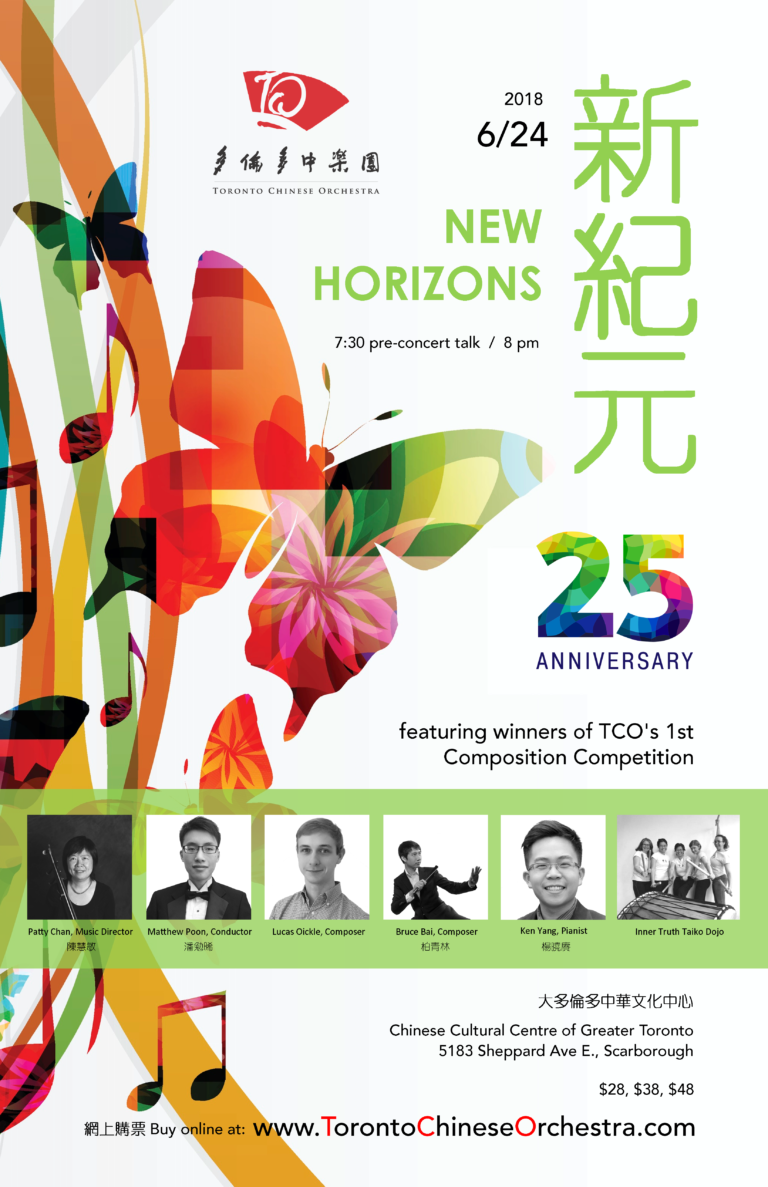Introduction to “Song of the Pipa”
Ancient poetry moderates this busy world, and elegant music soothes our heart.
In June 2012, the poetry of Bai Juyi and music of composer Huang Zi’s oratorio “Everlasting Regret” was performed in Toronto. I have always had great admiration for Bai Juyi’s literary creations. Over his lifetime, Bai wrote over 3000 poems. His famous poem, “Song of the Pipa”, is also my most frequently collaborated piece with the Hong Kong Chinese Orchestra. Now, three years later, I look forward to presenting this important work with the Toronto Chinese Orchestra, composed by Gu Guanren, to a Canadian audience.
Bai Juyi (772-846) was a honest court official. He was daring in condemning corrupt court practices and exposing social injustices. In this way he made himself many enemies among the corrupt and powerful. He was banished to Hangzhou and Suzhou, where he served as Provincial Governor. There, he tried to improve the quality of life for the common people by sponsoring many water works. He repaired wells, built embankments, and irrigated fields. He dug channels and beautified the West Lake. For two thousand years, these legacy projects were referred to as “Bai Ti”, meaning Bai’s Waterway, in memory of his contributions. When he left, he was sent away by a weeping and grateful populace.
As a poet, Bai believed he could make use of poetry as a medium to promote social functionality. He wrote allegorical poetry which were mostly veiled social commentaries and expressions of humanistic concerns. His vision became the motto for many future sympathetic scholars.
In 816-828 AD, Bai served another banishment in Jiangzhou as the Minister of War, for a
speech related infringement. It was in the second year of his term that he created this famous poem, “Song of the Pipa”. The composition used the plight of and his infinite compassion for the socially disadvantaged lower class female artists to express Bai’s own frustration with his own political misfortunes. The socialite described in the poem was a real person. Her name was Chen Waner, (born AD 776). Chen was born into a poor family. She studied music with her stepmother, Chen Lan. Bright and beautiful at sixteen, she was chosen to play with the palace Jiaofang (band). There she performed at Guangling aristocratic events, where her music and dancing charmed the audience, thinking she was a fairy visiting. Although these aristocratic suitors all adored her, her family background preempted any meaningful conclusion. When she was almost 25 years old, Waner’s stepmother and biological father passed away and her brother died in the army. Waner’s popularity also waned with time as the hospitality business always looked for new blood. She eventually became a street musician, experiencing the cruel reality of the saying – “Beautiful flowering is like running water (flowing away fast and does not come back)”. By age 33, she was married to a merchant, dwelling in a boat by the shore. In her spare time and by the Xunyang riverside, she would sing to herself, lamenting the impermanence future of her bleak life.
Waner was 42 years old and Bai was 46 when they were fatefully brought together by Waner’s emotional pipa rendition. Bai asked to meet again the following day. He then gave her the “Song of the Pipa” manuscript. From then on the verses the poem would be eulogized through the ages. Waner would often pour her heart out, shedding her tears with the poem. In 840 AD, Waner became seriously ill. Knowing her end had arrived, she recited the poem one last time and incinerated the yellowing manuscript with the fire of her light. She never woke up from that night’s sleep. She was 64 years old.
Bai later returned to serve in the Suzhou and Hangzhou vicinity. In his final years he would live in seclusion in Xiang Shan Si – a Buddhist monastery in Luoyang, by the Yi River. He died in August 846 AD in Luoyang and buried near the Yi River. He was 75 years old.
It has been said that “Children can recite Chang Hen Ge (Everlasting Regret), and foreigners can sing ‘Song of the Pipa’”. Both poems are Bai’s creations. For over a thousand years, Bai’s literary and spiritual legacy has received widespread admiration. He left us this famous heart gripping line – “In this uncaring world we are two wretched drifters, Treasure this encounter even though we’re strangers” – outlining the virtues of compassion and love for humanity beyond geographical borders.
By Roy Cheng
Translated by Kar Wah Chan





